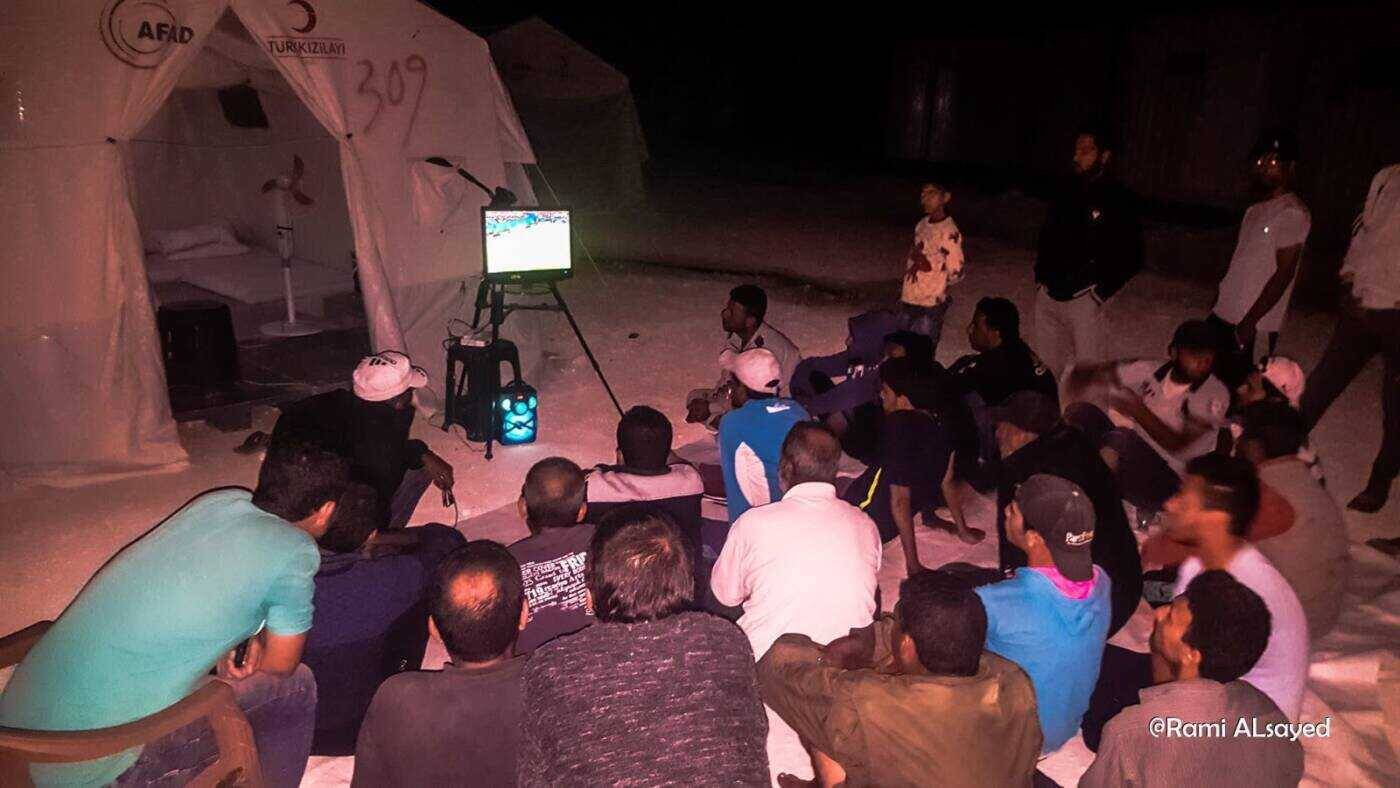In one Syrian displacement camp, World Cup an ‘escape’ from reality
Deir Ballut Camp residents watch the Spain-Iran World Cup match […]
9 July 2018

More than a dozen men, young and old, gather around Rami al-Sayyed’s plain white tent in rural western Aleppo province’s Deir Ballut displacement camp.
There, the camp residents sit on a tarp and watch as Spain’s national soccer team beats Iran on a small television screen that al-Sayyed, a photojournalist, has mounted on one of his camera tripods. A loudspeaker glows blue beneath the makeshift rig, attracting soccer fans from neighboring tents.
The Turkish-administered camp, established in April, houses hundreds of displaced Syrians from south Damascus and East Qalamoun, most of whom arrived after May 4 in surrender and evacuation deals between opposition factions and the Syrian government. Less than one kilometer from the Turkish border, Deir Ballut’s displaced residents scrape by without adequate medical supplies or clean drinking water. Disease is widespread.
So for 35-year-old al-Sayyed, who arrived two and a half months ago from the formerly Islamic State-held Yarmouk refugee camp south of Damascus, the start of the 2018 World Cup in June was an opportunity to “escape from reality” for a while.
He called on friends outside the camp to donate what he needed to host an outdoor soccer-viewing “cafe”—at first, all they had was an iPad perched on a table, with spotty internet connection. Then, they found a TV, a receiver and a speaker as more men and children from around the camp began to gather for the soccer matches.
With the World Cup’s final match approaching next week, al-Sayyed says the viewing parties are a chance to forget the harsh living conditions of Deir Ballut.
“Nobody in Deir Ballut has a TV, or any other form of entertainment,” al-Sayyed tells Syria Direct’s Leen Sayyid. “This is just a small way for people to escape their surroundings.”
Q: Where were you during the last World Cup, in 2014?
I watched the last World Cup in the Yarmouk camp [in south Damascus]. Life then was just as hard as it is today. During the 2014 World Cup, we were besieged and there were battles, bombings and a lack of security. Today, we are displaced.
I’m not a big soccer fan, but I am someone who’s interested in technology. I have internet routers, display screens and I know how to get around pay-per-view subscriptions, so all the guys used to come over to watch soccer matches.
In [my house in] Yarmouk, we set up two rooms like a cafe during soccer matches—they would be filled with my friends and acquaintances.
But now, after being displaced, the people who used to watch [the World Cup] with me four years ago [are gone]. Some of them left Syria, while others chose to stay in Damascus and settle with the regime. Some were killed.
I hope, if it’s in the cards for us, that my neighbors and friends can all get back together again to watch the next World Cup in Damascus.
Q: What gave you the idea to recreate your Yarmouk soccer match “cafe” in Deir Ballut?
The idea [to start screening movies and TV shows] came before the World Cup. My brother lives with me here in the camp and has three young children. His kids love watching animated movies, so I brought them cartoons to watch.
Gradually, the children in the camp started hearing the movies [from outside my tent], so they came into the tent and watched the TV with my brother’s kids.
Then, before the World Cup started, some of the young men in the camp asked me for help buying a movie screen and setting it up so they could follow [the soccer matches]. Being a sports fan is like an addiction—you can’t let a big soccer event like this go by without watching. So even though I’m not a sports fan myself, I knew I wanted to help the guys in the camp get their wish.
At first, we watched the [soccer] matches on an iPad screen. The internet would cut out while we were watching a match, coming on and off throughout.
When the audience grew larger, a nine-inch iPad wasn’t cutting it, so we started watching on a 20-inch TV. Then I bought a [television] receiver, which led to even more children, young men and old people coming to join in—all of them soccer lovers coming to watch in front of my tent in the camp.
Q: How do you think your screening project is helping your new neighbors in the camp?
I can’t really say it’s a ‘project’—it’s just a simple service that I provide for the people around me. It’s just a small drop in the sea of needs of the people here.
People here are living in difficult humanitarian and psychological conditions. Nobody in Deir Ballut has a TV, or any other form of entertainment. So watching a soccer game or a cartoon is an escape from reality.
Camp residents have much more pressing needs than entertainment. But, as they say: ‘Don’t bite off more than you can chew.’
This is just a small way for people to escape their surroundings in the camp.







